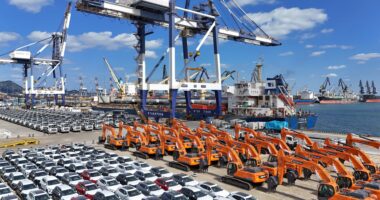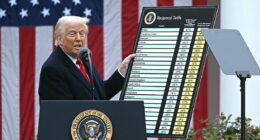Share this @internewscast.com
Anthony Albanese’s government is promising life will get easier today as new cost-of-living help is rolled out.
Minimum wage workers, new parents, tradie apprentices and families are set to be the big winners.
Inflation has moderated from recent three-decade highs, but costs including rent and insurance are still increasing, with $75 quarterly electricity rebates to expire at the end of 2025.
Treasurer Jim Chalmers has flagged new assistance that will kick in this week.
‘The Albanese Labor Government is delivering more real, practical and ongoing help with the cost of living for Australians, with more support set to roll out a week from today,’ he said.
‘This is more responsible, meaningful hip-pocket help for households.’
Australia’s 2.9million workers on awards or the minimum wage are getting a 3.5 per cent wage rise on July 1, which is more generous than the 2.4 per cent inflation rate.
The independent Fair Work Commission made the order on June 3, which will see the minimum hourly pay rise to $24.95 for a weekly, full-time wage of $948 or $49,296 a year.

Minimum wage workers, new parents, tradie apprentices and familes are set to be the big winners
But the government took credit for the $1,669 annual increase for the 200,000 Australians on the minimum wage.
‘The Albanese Labor Government is delivering what we said we would at last month’s election, rolling out billions of dollars’ worth of responsible support from 1 July,’ Chalmers said.
Compulsory employer superannuation is rising to 12 per cent on July 1, up from 11.5 per cent, with super also put into paid parental leave.
Former prime minister Paul Keating – who conceived compulsory superannuation alongside union boss Bill Kelty – said the system had finally matured.
‘Superannuation, like Medicare, is now an Australian community standard, binding the whole population as a national economic family, with each person having a place,’ Mr Keating said.
Paid parental leave is increasing to 24 weeks, up from 22 weeks.
The annual income limits will also increase – with the individual limit increasing to $180,007 as the family limit rises to $373,094.
New tradies who take up apprenticeships in housing construction will receive $10,000 in incentive payments, on top of their wages, during the life of the apprentice.
That includes $2,000 instalments at six months, a year, two years and three years.
A range of family benefits are also increasing on July 1.

Anthony Albanese ‘s government is promising life will get easier on July 1 when new cost-of-living help is rolled out
Family Tax Benefit Part A recipients will see the maximum payment for children under 13 rise to $227.36 a fortnight.
For children aged 13 or over, the rate will increase to $295.82 a fortnight.
The maximum rate of Family Tax Benefit Part B will increase to $193.34. For families with a youngest child aged five or over, the rate will increase to $134.96 a fortnight.
Social Services Minister Tanya Plibersek hailed the cost-of-living help.
‘The Albanese Labor Government’s number one priority is addressing cost-of-living pressures,’ she said.
Some things will be backdated to June 1, with Labor re-elected on a promise to cut university student debt by 20 per cent – or an average of $5,520 – at a cost to taxpayers of $16billion.
But more income tax relief will have to wait until July 1, 2026, when the 16 per cent tax rate for workers earning $18,201 to $45,000 is reduced to 15 per cent – leading to tax relief of $268.
And from 1 July 2027, the tax rate will be reduced to 14 per cent – bringing relief of $536 over two years.
That means every Australian taxpayer earning above $45,000 will get an extra tax cut of $268 in 2026-27 and $536 from 2027-28.
While wages and government assistance payments were going up, so too were price hikes for business registration and energy bills, which could be up to 9.7 per cent higher for some households.
Increased costs for businesses and households would hit living standards and hamper productivity, said shadow treasurer Ted O’Brien.
“This new financial year was Labor’s chance to reset, instead Labor have doubled down on higher costs, more red tape, and policies that make life harder for working Australians.”








